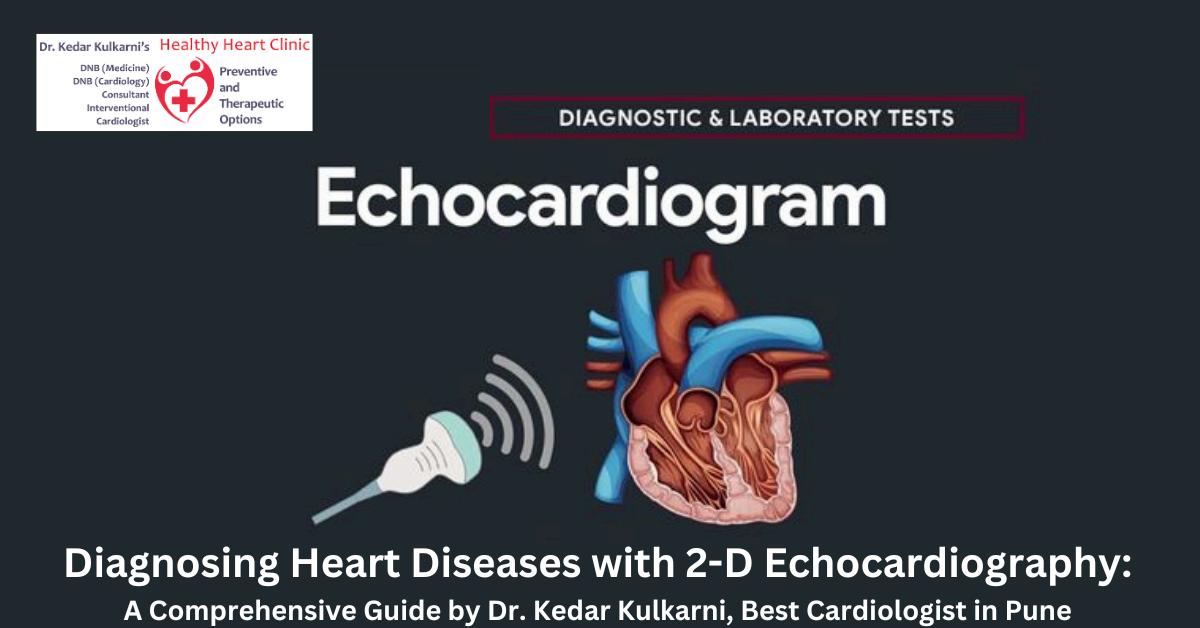Diagnosing
Heart Diseases with 2-D Echocardiography: A Comprehensive Guide by Dr. Kedar Kulkarni, Best Cardiologist in Pune

Heart disease remains a leading cause of mortality worldwide Accurate diagnosis is crucial for effective treatment and management One of the most powerful tools for diagnosing heart diseases is 2-D echocardiography. Dr. Kedar Kulkarni, renowned as the best cardiologist in Pune, sheds light on how 2-D echocardiography aids in diagnosing various heart conditions
What is 2-D Echocardiography?
2-D echocardiography, or two-dimensional echocardiography, is a non-invasive imaging technique that uses ultrasound waves to create detailed images of the heart It allows cardiologists to visualize the heart's structure and function in real-time, providing essential information for diagnosing a wide range of heart diseases.
How 2-D Echocardiography Works
During a 2-D echocardiogram, a transducer emits ultrasound waves that penetrate the chest wall and reflect off the heart structures. These reflected waves are captured and converted into images by a computer The resulting images show the heart's chambers, valves, and blood vessels, allowing for a thorough examination of cardiac anatomy and function
Diagnosing Heart Diseases with 2-D Echocardiography
1 Coronary Artery Disease (CAD)
Coronary artery disease, caused by the narrowing or blockage of coronary arteries, can lead to angina and heart attacks. 2-D echocardiography helps in detecting wall motion abnormalities and assessing the extent of damage to the heart muscle Stress echocardiography, a specialized form of 2-D echo, evaluates how well the heart functions under stress, which is crucial for diagnosing CAD
2. Heart Valve Diseases
Heart valve diseases, such as stenosis (narrowing) or regurgitation (leakage), significantly impact heart function 2-D echocardiography provides detailed images of heart valves, enabling the assessment of their size, shape, and movement. Doppler echocardiography, an advanced feature, measures blood flow across the valves, helping in quantifying the severity of valve diseases
3. Cardiomyopathy
Cardiomyopathy involves the deterioration of the heart muscle, leading to heart failure. 2-D echocardiography evaluates the thickness and movement of the heart walls, detects abnormal heart muscle conditions, and assesses the heart's pumping capacity It is instrumental in diagnosing different types of cardiomyopathy, including dilated, hypertrophic, and restrictive cardiomyopathy
4. Congenital Heart Defects
Congenital heart defects are structural abnormalities present at birth 2-D echocardiography is vital in diagnosing these defects, such as atrial septal defect (ASD), ventricular septal defect (VSD), and tetralogy of Fallot. Detailed images of the heart's anatomy help in planning appropriate surgical or interventional treatments
5. Pericardial Diseases
The pericardium is the protective sac surrounding the heart. Pericardial diseases, including pericarditis (inflammation) and pericardial effusion (fluid accumulation), can be life-threatening 2-D echocardiography visualizes the pericardium and detects abnormalities, aiding in the prompt diagnosis and management of these conditions
6 Aortic Aneurysms and Dissections
An aortic aneurysm is an abnormal bulge in the wall of the aorta, the main artery carrying blood from the heart to the rest of the body Aortic dissection is a severe condition where the inner layer of the aorta tears. 2-D echocardiography helps in detecting aneurysms and dissections, providing critical information for timely surgical intervention
Advantages of 2-D Echocardiography
2-D echocardiography offers several advantages in diagnosing heart diseases:
1 Non-invasive: Unlike invasive procedures, 2-D echo does not require any surgical intervention, making it safe and comfortable for patients
2 Real-time Imaging: It provides real-time images of the heart, allowing for immediate assessment and diagnosis
3 Versatility: It can be used to evaluate a wide range of heart conditions, from structural abnormalities to functional disorders
4. Portability: Portable echocardiography machines enable bedside examinations, crucial for critically ill patients
5 Cost-effective: Compared to other imaging modalities like MRI or CT scans, 2-D echocardiography is relatively affordable and widely accessible.
Preparing for a 2-D Echocardiogram
For patients scheduled for a 2-D echocardiogram, preparation is minimal Dr Kedar Kulkarni advises the following:
● Fasting: Fasting is generally not required unless the procedure is combined with a stress test.
● Clothing: Wear comfortable clothing and avoid jewelry that might interfere with the procedure
● Medications: Continue taking prescribed medications unless advised otherwise by your doctor
● Relaxation: Stay relaxed and follow the technician's instructions during the procedure for optimal imaging results
The Procedure
A 2-D echocardiogram is typically performed in a cardiologist's office or a hospital Here’s what to expect:
1. Positioning: You will lie on an examination table, and a gel will be applied to your chest to facilitate the transmission of ultrasound waves
2 Transducer Placement: The technician will place the transducer on various parts of your chest to capture images from different angles.
3 Image Capture: You may be asked to change positions or hold your breath briefly to obtain clearer images
4 Duration: The procedure usually takes 30 to 60 minutes, depending on the complexity of the examination.
Interpreting the Results
The images obtained from a 2-D echocardiogram are analyzed by a cardiologist Dr Kedar Kulkarni explains that the interpretation involves assessing the size and shape of the heart, the functioning of the heart chambers and valves, and the presence of any abnormalities Based on the findings, a diagnosis is made, and an appropriate treatment plan is formulated
Conclusion
2-D echocardiography is a cornerstone in the diagnosis and management of heart diseases Its ability to provide detailed and real-time images of the heart makes it an invaluable tool for cardiologists Dr Kedar Kulkarni, with his extensive expertise and dedication to patient care, utilizes 2-D echocardiography to diagnose and treat a wide range of cardiac conditions, ensuring the best possible outcomes for his patients in Pune
For more information or to schedule a consultation, contact Dr Kedar Kulkarni’s clinic today Your heart health is our priority
